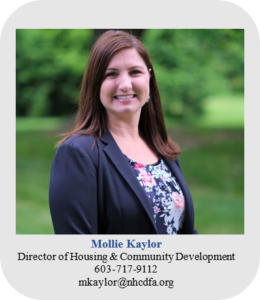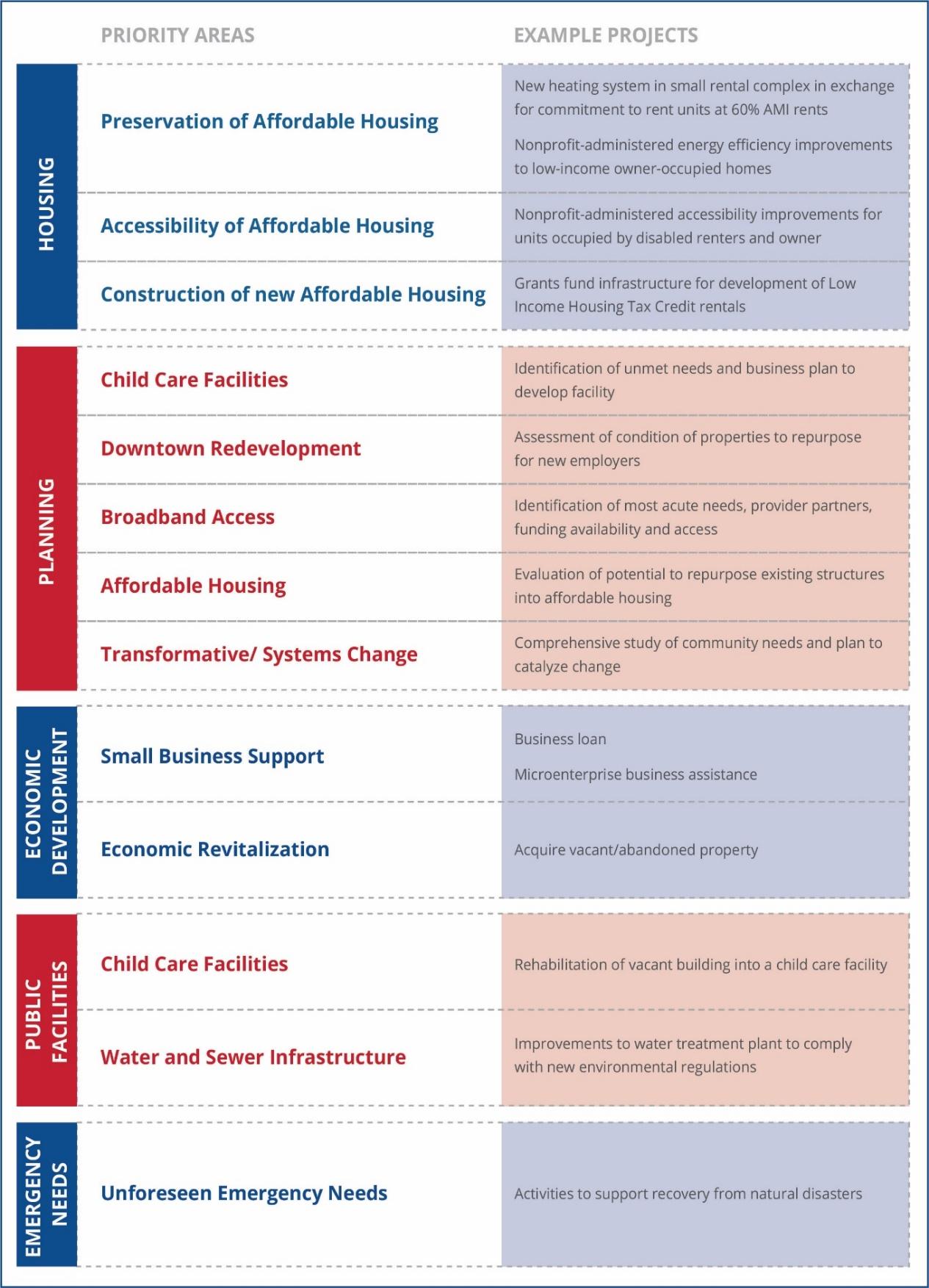Eligibility
New Hampshire’s CDBG program is offered to eligible cities and counties for a wide range of activities as authorized under Section 105(a) of the Housing and Community Development Act (HCDA) of 1974, as amended. The state annually expects to receive new CDBG funds for distribution to non-entitlement cities and counties for eligible projects. The CDBG funds covered by this Method of Distribution (MOD) include: annual program year funds, unobligated program year funds, any program income received and grant funds recaptured from projects funded in prior grant years. CDFA will manage the competitive award and funding process for eligible projects under this Method of Distribution.
Your city or county is eligible to apply for CDBG funds if:
- You do not receive CDBG funds directly from HUD. In 2021, the cities of Manchester, Nashua, Portsmouth, Dover, and Rochester received HUD funds directly.
- You have a project that needs funding and meets the CDBG priorities and National Objectives discussed below.
- You have a project that aligns with NH’s CDBG priority activities.
Two or more local governments (for example, a city and a county, or two cities) may work on an application for a regional project. In such cases, only one jurisdiction can be the primary applicant and act as the responsible party under the contract with the state. Joint applications where two or more parties are equally responsible will not be accepted. Regional projects are activities that benefit more than one jurisdiction and address a common problem in a region. The maximum funding available for a joint application shall be the same as for an individual applicant.
Grantees can administer the funds within their organization (e.g., town staff, nonprofit staff) or through agreements with a contractor or subrecipient through procurement procedures.
Subject to the specific requirements of each type of grant or subcategory, funds can be awarded as:
- A direct grant to a grantee;
- Grants, loan guarantees, interest rate subsidies or loans to an eligible subrecipient by the grantee;
- Interest rate subsidies or other favorable terms from a bank participating in the project with the grantee; or
- Any other innovative financing used either singly or in combination with items listed above, with permission from CDFA.
Cities and counties cannot “pass through” the awarded funds to another city or county to carry out the project activities. The recipient must carry out the project activities and remain fully responsible for the grant-funded project’s compliance with all federal and state requirements. In other words, the project must be under the direct control of the grant recipient at all times.
Funding Priorities
HUD requires that states establish priorities for CDBG among the types of eligible activities. Municipalities’ applications for funding must be consistent with the identified funding priorities, listed below:
- Emphasize solving community problems with long-term community development benefits and innovative solutions.
- Strengthen the resiliency and vibrancy, facilitate financial stability, and attract capital to the state’s communities.
- Provide additional resources for the development of affordable housing and rehabilitation of existing affordable housing.
- Preserve and promote existing neighborhoods and community centers.
- Provide improved housing and public facilities or employment opportunities primarily to low- and moderate-income persons or households. (Grants shall not benefit moderate-income persons to the exclusion of low-income persons).
- Build partnerships with municipalities and nonprofits with limited capacity and leveraging private and other public funding sources where feasible.
- Fund needed projects for which other private or public funding is not available.
National Objectives and Eligible Activities
National Objectives and Eligible Activities describes the federal requirement that all CDBG-funded activities fulfill one of three National Objectives established by Congress. Applicants can learn more about the National Objectives, Eligible activities and how to documentation compliance in the CDFA’s Community Development Block Grant Implementation Guide found here: https://resources.nhcdfa.org/programs/community-development-block-grant/implementation/
To accomplish the national, state and current program year objectives, there shall be five grant categories, as follows:
- Housing
- Public facilities
- Economic development, which shall consist of the following subcategories:
- Business Loan
- Real Estate Development
- Public Infrastructure
- Nonprofit Grants for Xxx
- Microenterprise Development
- Job Training
- Business Technical Assistance
- Emergency needs
- Planning
3.1 How do I know if my project idea will be funded?
3.2 Target Funding among Category Areas
3.3 Ineligible activities
3.4 Maximum Grant Amounts for Category Areas
3.5 Funds Remaining


